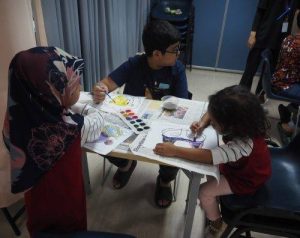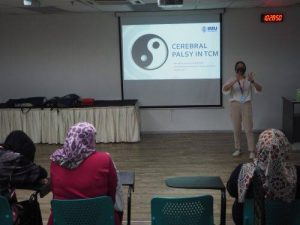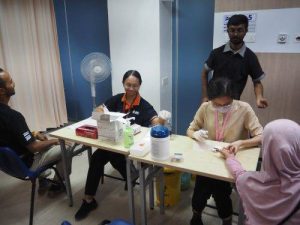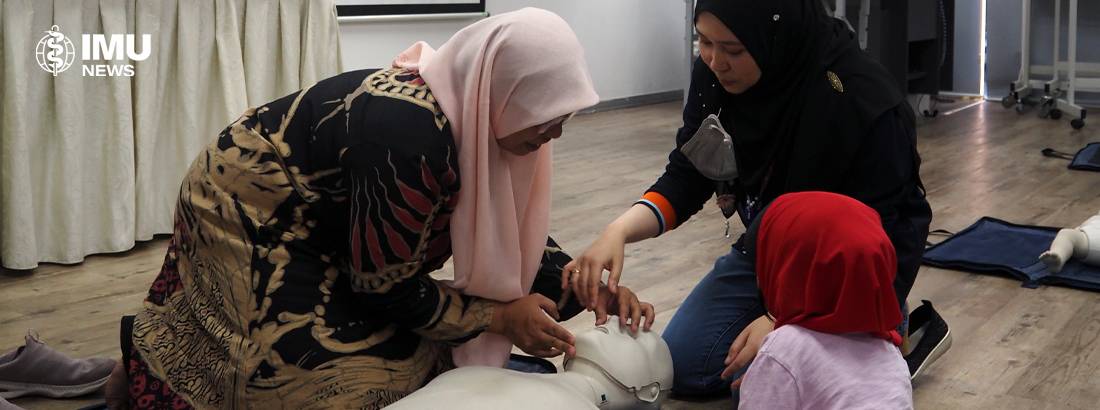As part of a community service project for public health and in line with IMU Cares‘ mission to promote good health and wellbeing, as well as quality education, a group of IMU faculty from the Clinical Skills Department, in collaboration with the Chinese Medicine and Chiropractic Departments, along with students from each programme, successfully conducted a community service event for the children and parents of Gabungan Anak Anak Palsi Serebrum (GAPS) at IMU Bukit Jalil on 18 May 2024.
The main objective of the event was to assess and screen parents and children of a vulnerable community, in this case cerebral palsy (CP), for common non communicable diseases and to provide education and awareness on common diseases. A secondary objective was to provide education and awareness of basic life support as the lifesaving information and techniques could assist parents when dealing with their children.
Prior to the event, a pre visit as well as multiple meetings with the managing team at GAPS was done, to get to know more about the community and to collect some background information about what is already being done for the children with cerebral palsy and their parents. The pre-visit helped to understand the needs of the parents and to effectively prepare and deliver suitable information and knowledge.
Based on the feedback provided by the managing team at GAPS, while most of the children were already on medical follow ups and had conventional treatments for their specific conditions, a rarely known perspective about their conditions or symptoms is through a complementary view of healthcare, targeted to cerebral palsy. They expressed interest in not just a medical screening and consultation but also in a Chinese medicine assessment and consultation and spine health assessment and consultation.



During the event, multiple health screening booths were set up, including a children’s corner to entertain and keep the children in the event occupied, while their parents attended a few short talks. The talks held were Introduction of Basic Life Support, Common Ailments from a Chinese Medicine Perspective and Spine Health. These talks were run by Clinical Skills Department (CSD) from School of Medicine, Chinese Medicine Department and Chiropractic Department from School of Complementary and Alternative Medicine respectively.
After the talks, the health screening booths went into full swing, with 2nd year medical students manning all booths and carrying out the screening under the supervision of CSD. The complementary medicine booths were also run by students and faculty. Students also took an active role in other supporting activities like the registration, playing with children in the children’s booth, directing and managing questions from the parent participants.
Participant’s Feedback
Participants found the event very useful, reporting that they had learned so many new things that they had not known previously. Below are some of the participant’s feedback:
“Thank you for inviting me to an event that gave me a lot of knowledge to put into practice later”
Puan Norazilah Binti Hisham, participant and parent of a 9-year-old daughter with cerebral palsy.
“Wonderful programme. Learnt so much new knowledge. Hope can do more.”
Puan Rafidah Ahmad, Manager at GAPS, participant, and parent of a 19-year-old daughter with cerebral palsy.
“Diversify the learning related to the care of bedridden children”
Encik Muhammad Hafifi, participant and parent of an 8-year-old daughter with cerebral palsy.
Students' Feedback
Students also had a good experience during this event.
Second year student, Mariyam Raukash shared her experience:
“It was actually one of my first few experiences joining this type of community event and I’m very glad I did. It was such a lively environment from the entire team, the doctors and the student helpers. I found it to be quite a fun enjoyable session that went on with smiles throughout. From this event, I learned more about what CP is and that parents and caretakers of those with CP need special knowledge on how to take care of their kids in times of danger as well as during normal day to day lives. Despite that, they’re all quite bubbly happy and lively which was really nice to see. I think I would really love to join more sessions like this in the future!”
Another student, Wan NurFazryna shared her experience:
“I learnt that all humans are the same because even though they are a bit different physically or mentally, they also have feelings. When we played the lullaby song, most of the children enjoyed it and it brings happiness to me. Secondly, I respect the parents the most because it must be very hard for them since the children can’t communicate well. However, the parents know how to handle their children and their children needs.”
The event has given the students the opportunity to apply their knowledge and skills that they have gained through their respective programmes and helped to further enhance their communication skills through interacting with parents and children of a vulnerable community group. Not only that, this project has greatly impacted the parent participants who attended, with many of them leaving with so much new information and knowledge that they can implement to assist their children better.
We believe that through this meaningful project, the parents would be able to improve their understanding about cerebral palsy from a complementary medicine perspective as well as utilize multiple new techniques and activities to manage symptoms their children may experience.
Thank you to all faculty and students who assisted in making this project a successful one, and to the parents and managing team at GAPS for giving us advice and helping us a lot throughout the project planning and execution. We would like to express our sincere gratitude to IMU Cares for supporting this project, and we look forward to carrying out many more such events in the future.
Prepared by Dr Ranila Sirisinghe


